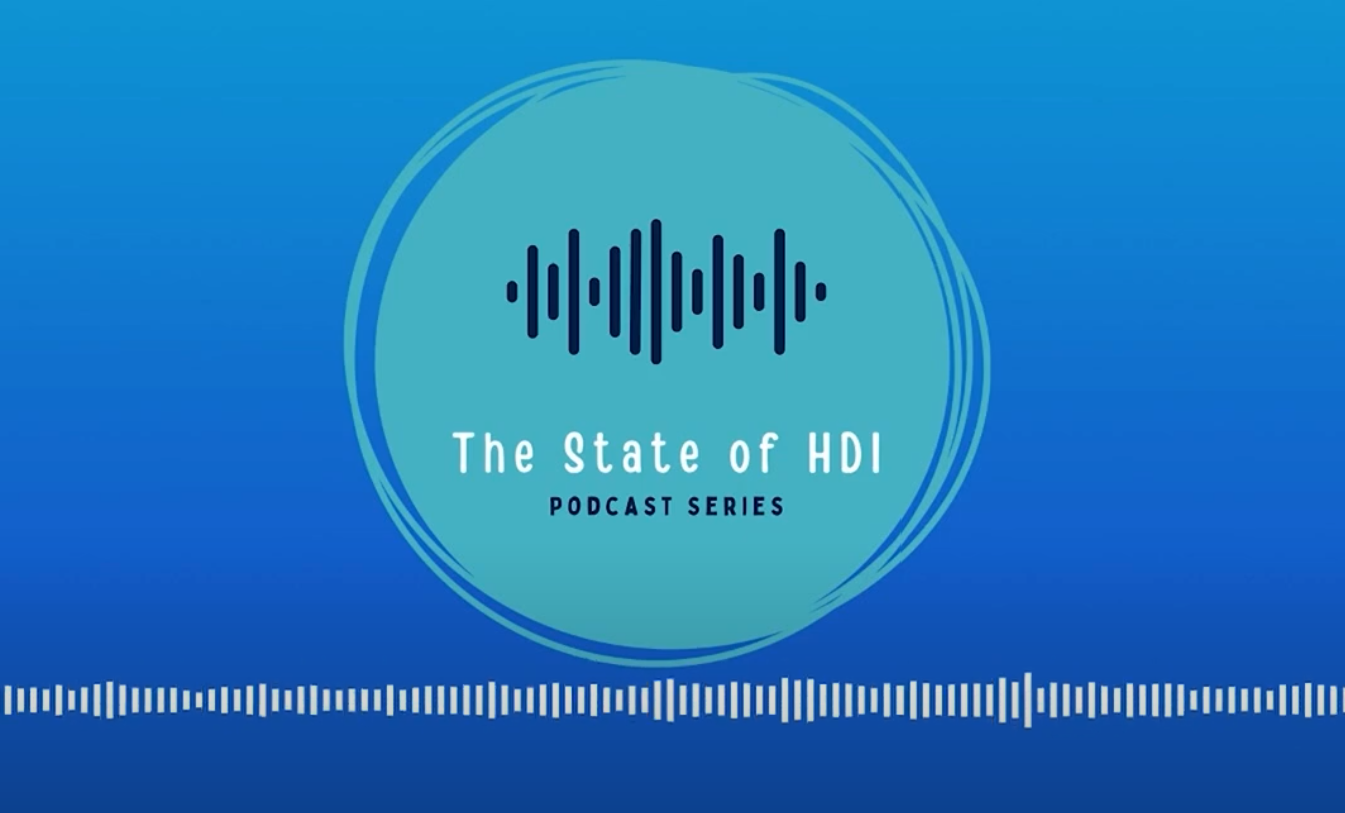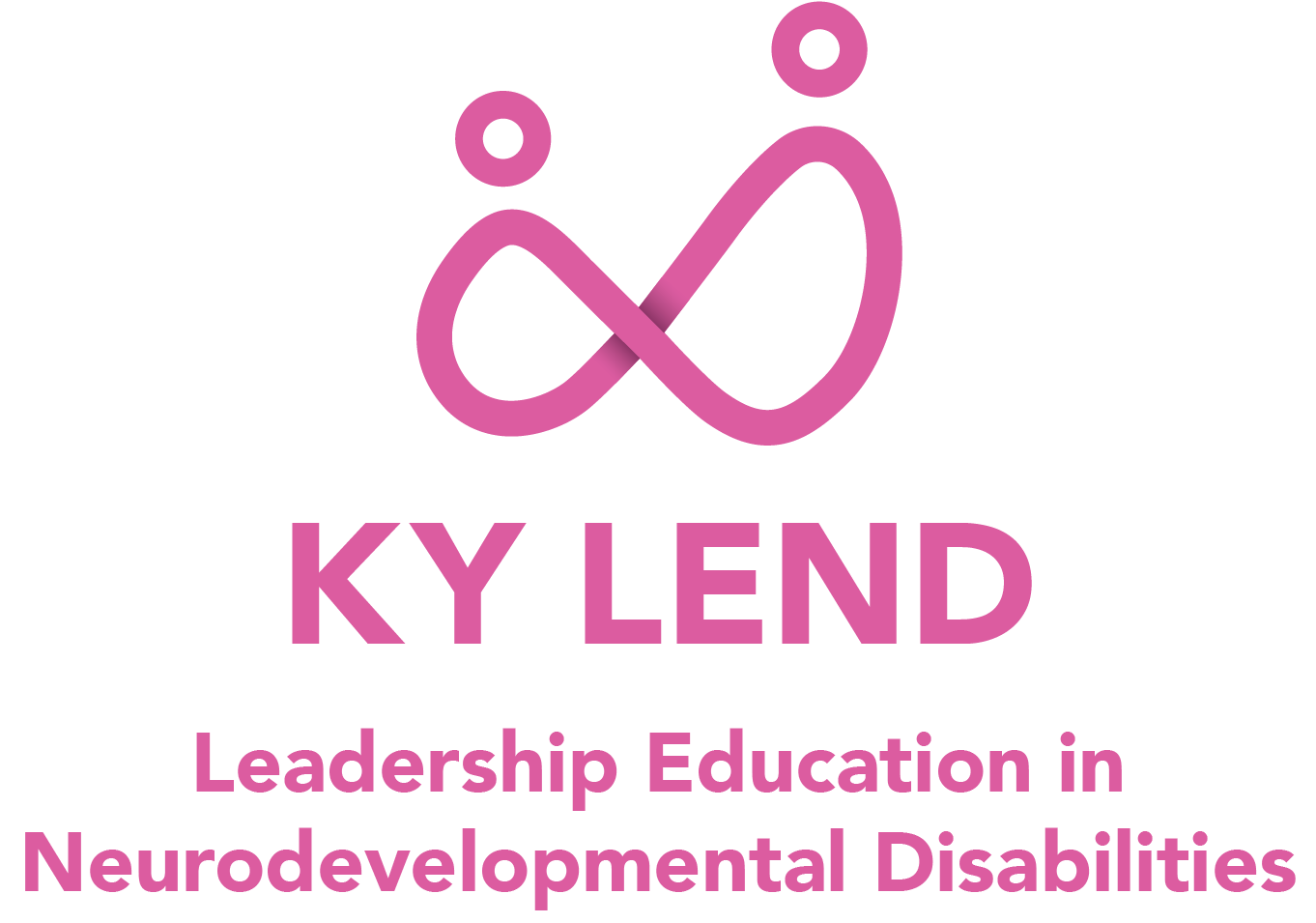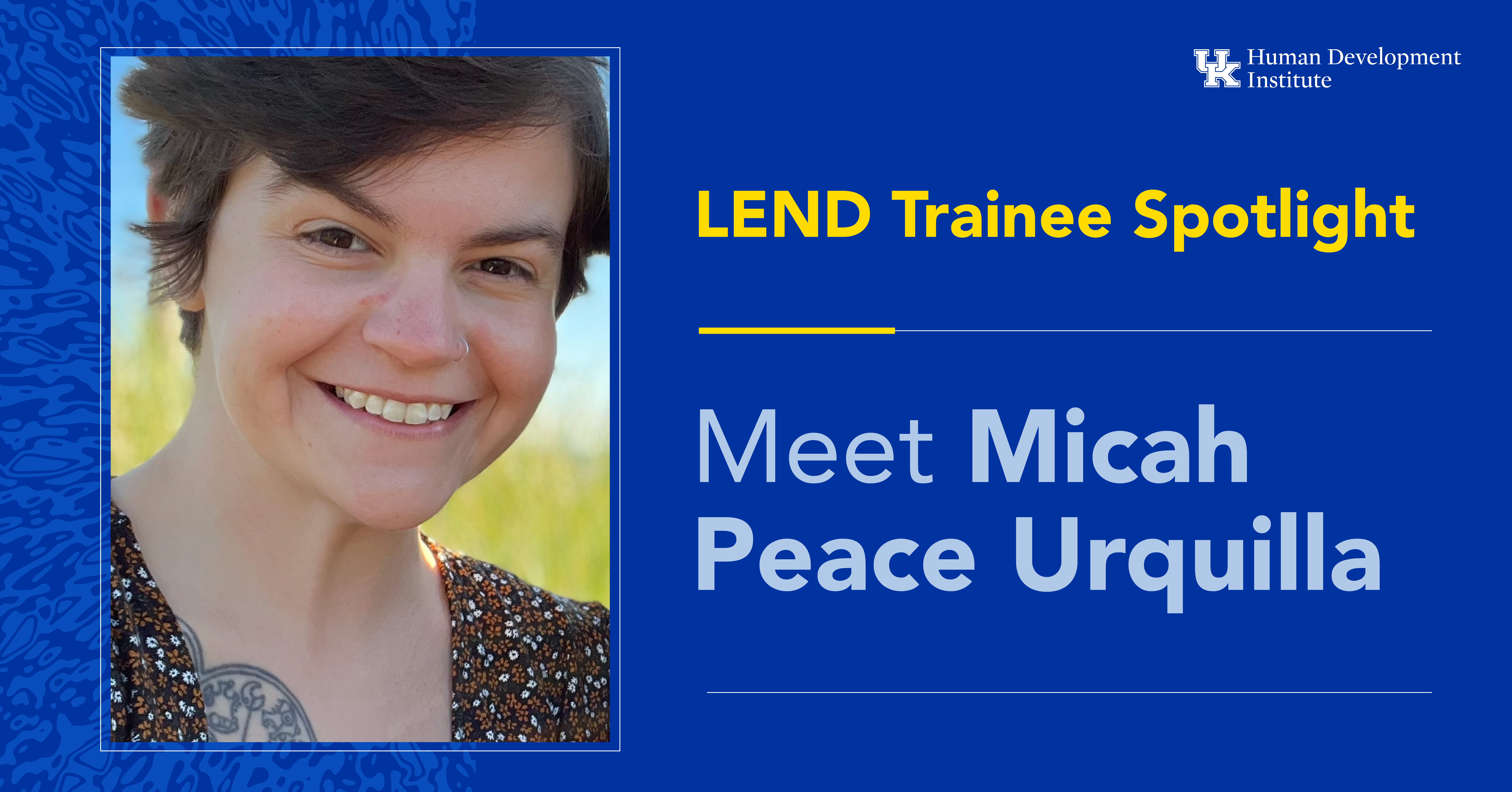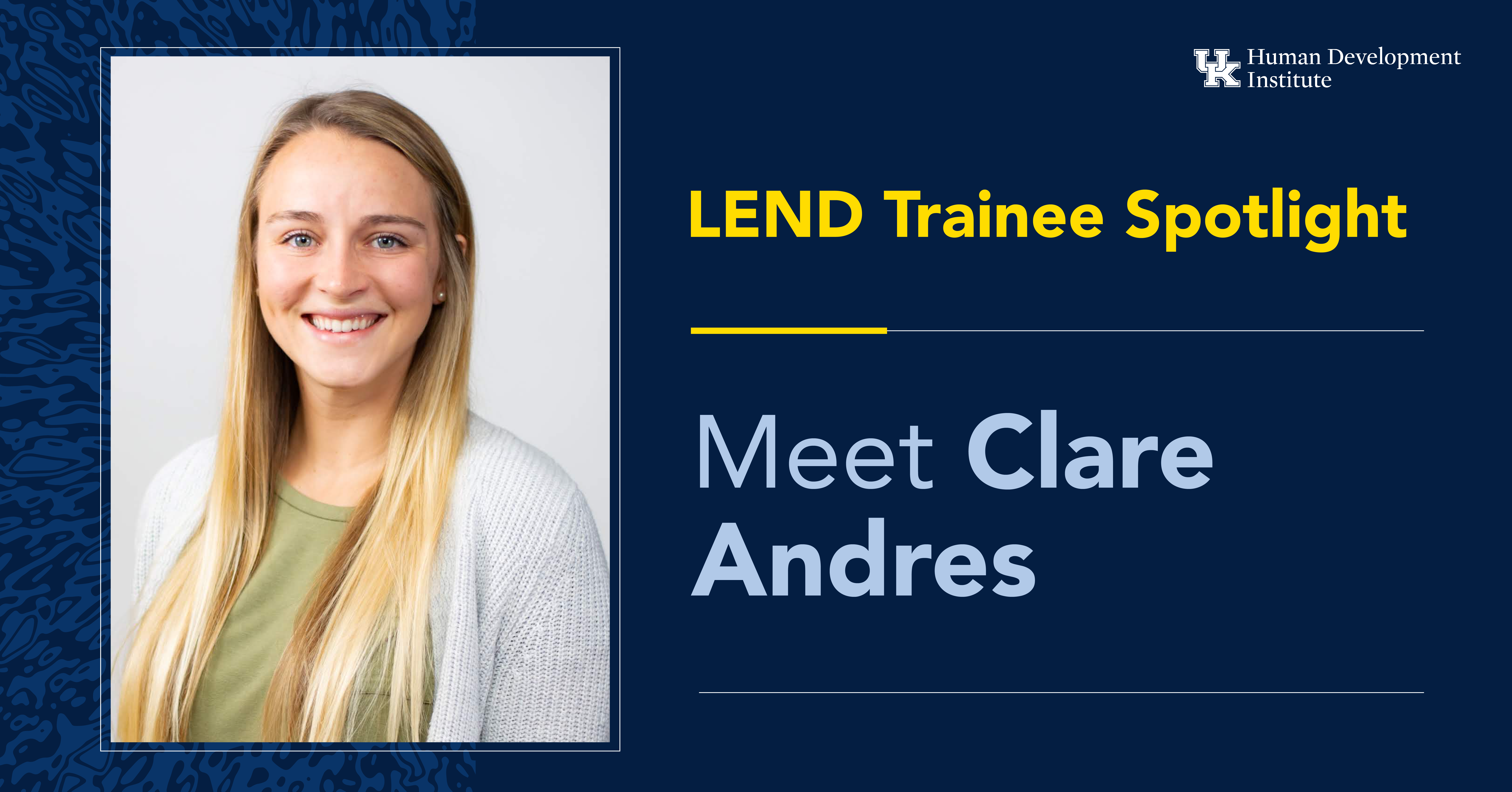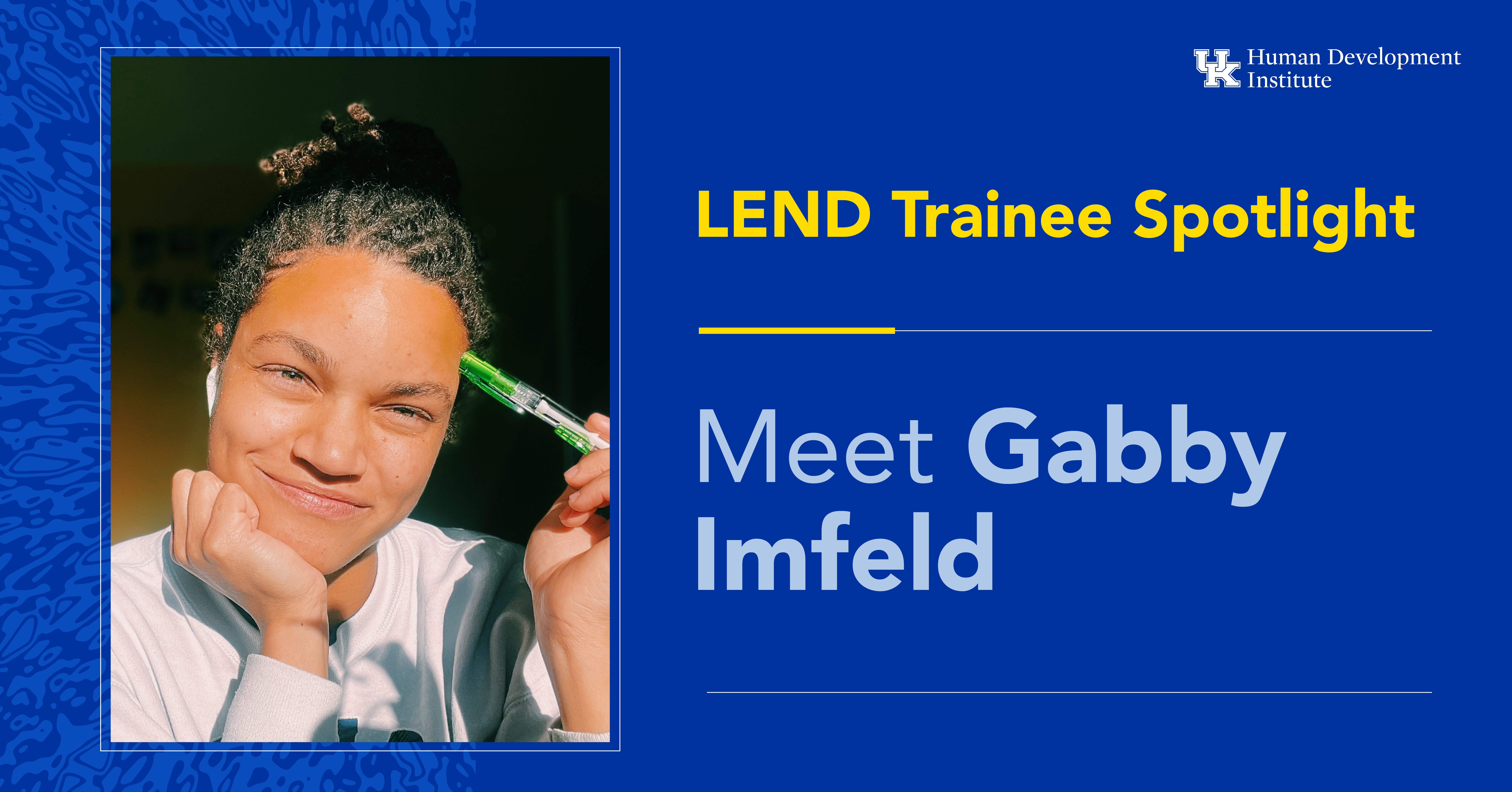LEND stands for Leadership in Education for Neurodevelopmental and other related Disabilities. Listen as Caroline Gooden and Stephanie Battistini describe why this program is essential for a team approach to providing care to people with developmental disabilities.
State of HDI Episode 5: KY LEND Program
The Human Development Institute hosts the State of HDI Podcast. The views and opinions expressed in this program are those of the speakers and may not reflect the views of the University of Kentucky. A downloadable transcript is available in the description. Thank you for listening!
Patti Singleton
Hello and thank you for tuning in to the state of HDI, a University of Kentucky Human Development Institute podcast. This is Patti Singleton. With me in the studio are Caroline Gooden, and Stephanie Battistini. Caroline is the training director at HDI and Stephanie is a developmental behavioral pediatrician at the University of Louisville. Welcome to you both. So Caroline, tell me what the LEND is.
Caroline Gooden
I would be glad to tell you about the LEND. LEND stands for Leadership in Education for Neurodevelopmental and other related Disorders. It’s an exciting training program. It includes nine trainees or students and interdisciplinary faculty team and professionals across the state. Each year we have nine trainees including a self-advocate with a disability, a family member of a person with a disability and seven graduate students. The students attend college at UK, University of Louisville, and Eastern Kentucky University. Their areas of study are intentionally varied to produce an interdisciplinary learning setting. Their fields thus far have included medicine, education, psychology, special education, physical therapy, speech and language therapy, kinesiology and health, music therapy, educational leadership, and social work. Our faculty members are from the same areas, as well as Rehabilitation Science and Early Childhood.
Patti Singleton
That’s fantastic. And Stephanie, as a LEND trainee and Kentucky transplant, tell me what the program was like for you.
Stephanie Battistini
Well, Patti, the program for me was fantastic, especially as a Kentucky transplant, it allowed me to learn more about the Kentucky landscape as far as what the community that I am serving as a developmentalist; like what their struggles are, what their strengths are, and how to best approach them. And you can imagine the LEND classes being more like a discussion, and even a brainstorming session discussing various topics as well as dilemmas that many families and patients face throughout Kentucky.
Patti Singleton
That’s great. And Caroline, you listed the majors, but can you tell us a little bit about the trainees that have participated in the LEND?
Caroline Gooden
I would be delighted to tell you about our trainees, we are delighted to have Stephanie with us today who was our – in our first cohort last year has definitely brought a great medical and a really humanistic perspective to our program. So, our trainees are a really diverse group each year. They include students in physical and speech therapies, who are completing rigorous clinical programs, social work students who will work with persons with disabilities, health promotions researchers, clinical psychologists – who will be evaluating and treating persons with disabilities – community organizers, family members, and advocates. Each one is special to us, as we are able to watch their amazing growth over the course of the year. They begin as students; they leave us as leaders in their fields. They form a close collaborative group with their fellow trainees and join a national group of highly respected lead trainees. Several of our LEND faculty are former LEND trainees. Steph is an outstanding example of a trainee with partnerships in Kentucky as a result of her LEND work. Her partnerships include University of Louisville and UK Healthcare, with the Kentucky Department for Aging and Independent Living, as well as continued connections with her LEND cohort.
Patti Singleton
And so, to continue that, Stephanie, can you tell us how the LEND has prepared you for the work that you do?
Stephanie Battistini
Oh, that is such a big question for me, because when truly opened my eyes to many of the resources that Kentucky has available for families and the many patients that I serve, it also allowed me to really build connections across multiple specialties and disciplines. In my practice, I lean a lot on other professionals to help my families and patients learn, obtain skills, and really get what they need from the community to live the most fulfilling life that they can. I think one of the big things that LEND really taught me was the importance of working with a dedicated team to really serve the community of Kentucky the best way that we can.
Patti Singleton
And so, Caroline, tell us what is the reach of the LEND program?
Caroline Gooden
Patti, that’s also a great question. The LEND faculty and partners are present across many universities, state agencies, and community groups in Kentucky. In addition to our three partnering universities, one of our students Direct Services for Students with Disabilities at Hazard Community College this year. Some of our participating state partners include the Department for Public Health, the Department for Behavioral Health, Protection and Advocacy, The Centers for Independent Living, the Office for Children with Special Healthcare needs, the Kentucky Autism Center, many Human Development Institute state and national projects – including the National Center for Prenatal and Postnatal Resources, Innovative Supports for Autistic Workers, and HDI Center for Assistive Technology. So, you can see that we have a broad reach across partners across the state. Our partnering community agencies include UK’s Early Childhood Laboratory, the Child Development Center of the Bluegrass, the Allegro Dance Project, and more agencies participating each year. We have students placed in each of these settings each year. Stephanie, can you tell us one of the connections you have made and sustained since your time in the LEND?
Stephanie Battistini
Oh, yes. I think one of my favorite connections that I made while participating in LEND was the one with the Office for children with Special Healthcare Needs, as I had the opportunity to not only work with one of my mentors, Dr. Gail Williams, but I also got to work with the wonderful staff associated with the office. As well as with Dr. Mary Beth Bundy, one of – an amazing, licensed psychologist. And it was an eye opening experience as they did their evaluations via Telehealth. And I was able to observe them and observe the ways that they approached these families who live in rural parts of Kentucky, and what sort of resources and anticipatory guidance they gave these families to ensure that their child had the best resources and therapies available for them.
Patti Singleton
Stephanie, the role of an advocate looks different across the specialties participating in the LEND, how has your experience change your perspective of advocacy and leadership?
Stephanie Battistini
So, the biggest thing that I took away from LEND as far as the role of being an advocate and a leader for children with special health care needs is that it truly takes a team or a village to really help their families and the patient to make sure that they are obtaining the right therapies and the right services, and in appropriate timing. So, I think it’s really important that the future LEND cohorts have a passion for advocacy, as not only will you advocate for these patients in your work or professional role, but many times I play an advocate for these children in the school system, or within different therapy programs to ensure that they are getting the right resources or accommodations that they have the right to. In addition, I think it’s really important that as an advocate, you really understand the landscape. You know, unfortunately, with the COVID pandemic, there is a strain on the system. And many programs unfortunately have a waitlist. And I think it’s important that as a developmentalist that I advocate for these patients, and that I try to be as creative as possible in making sure that they understand that they can place themselves on multiple waitlists, and that they should keep me up to date if they continue to have difficulties as time is really important when it comes to early intervention, for example. And lastly, you know, one of my biggest passion is education. And, you know, I and I thoroughly enjoy educating not only my parents, of my patients, but I also enjoy educating our future pediatricians. And I think it’s really important that any learner from any sort of specialty or interdisciplinary profession that works with children with different neurodevelopmental disorders, that they understand how they can advocate, how they can reach out to leaders that can make a change, and how they can get involved in the community.
Patti Singleton
That’s so great, Stephanie, thank you for that. And Caroline, will you tell us what the measure of success for the LEND will be?
Caroline Gooden
I am glad to talk about the measures of success for the LEND. The success of the LEND will be the production of leaders who are trained and ready to improve services with persons with neurodevelopmental disabilities, as Stephanie indicated, across all fields of service. We will also see the success of led by the creation of increased diagnostic and treatment settings, an increased collaboration by professionals across agencies. Woven throughout all these improvements must be the voices of self-advocates, informing the best course of action by persons with lived experience.
Patti Singleton
That’s fantastic. And how can someone apply to participate in the LEND?
Caroline Gooden
We encourage applications even as we speak, the application deadline closes on March 13th. So, to apply, go to hdi.uky.edu/kylend and scroll down to apply to be a 2023-2024 trainee, and follow the instructions there. Just a simple Qualtrics form that you will use. If you have any questions, feel free to contact us. And again, applications close on March 13th.
Patti Singleton
That’s great, Caroline. And we’ll make sure that the contact information and that link to the application are included in the show notes. So, Stephanie, and Caroline, do you have any last thoughts that you would like to share before we sign off?
Stephanie Battistini
I just want to say that LEND was an amazing experience. And I hope that LEND in Kentucky is something that continues for many, many years. In my short time here in Kentucky, I can tell you that we need more professionals who have a passion who want to advocate for our children with neurodevelopmental disorders. And LEND is just one of the many ways that not only professionals but families and self-advocates can get involved with.
Caroline Gooden
Thank you, Stephanie, I agree with what you’ve said. And I would just add that LEND is a unique opportunity for our graduate students, for our self-advocates, for our family members across Kentucky to improve services for children and adults in Kentucky who have disabilities. That really is the goal of our project. And it happens through a unique combination of a mix of wonderfully trained folks whose goal really is to improve services for children and adults across Kentucky. We are a close group of professionals and family members. And we do hope that LEND will be here for years to come to improve the services in Kentucky.
Patti Singleton
Well, thanks to you both for your work and dedication to enhancing the lives of people with disabilities. We’ll make sure that all of the links that we’ve mentioned will be included on the show notes. And thank you for listening.
https://hdiuky.podbean.com/e/state-of-hdi-episode-5-ky-lend/
Relevant Links
Find more information about the KY LEND here! hdi.uky.edu/kylend
Application Survey: uky.az1.qualtrics.com/jfe/form/SV_cJeRRQzFDEfWZwy
You may be asked to have an interview as part of the application process. If you have questions or need help in applying, call Caroline Gooden at 859.582.5134 or email cjgood2@uky.edu
The State of HDI podcast explores the initiatives and projects at the University of Kentucky Human Development Institute (HDI). This podcast is part of our ongoing work to bring together the efforts of HDI projects and staff and the ever changing state and national landscape of important issues. Contact patti.naber@uky.edu for more information.
